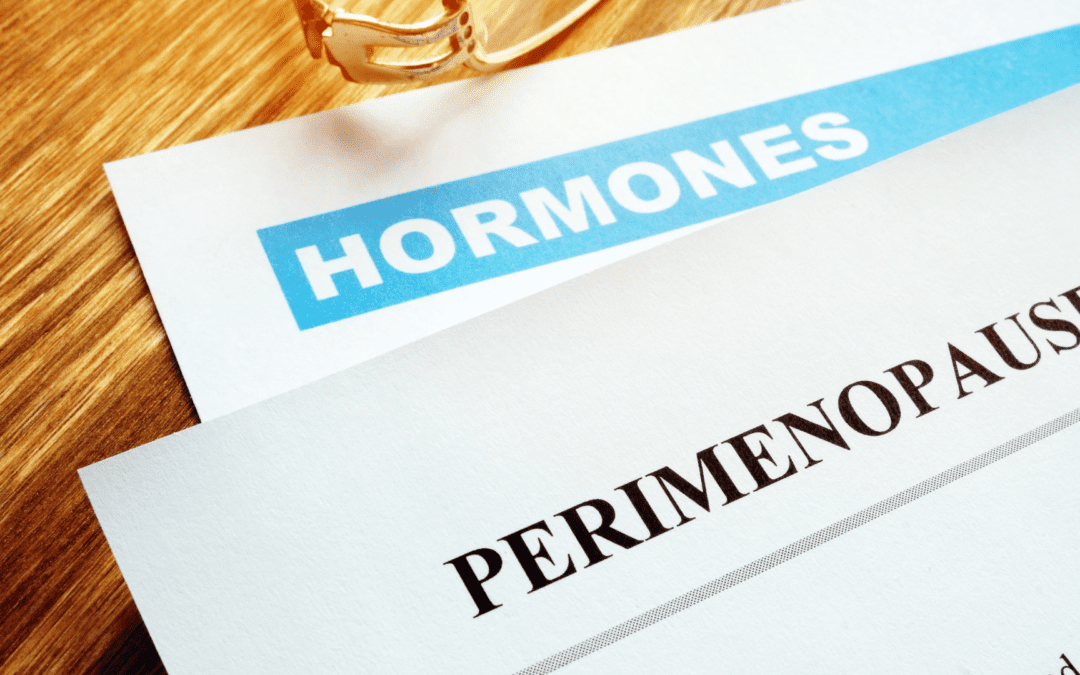As women, we’re versed in the narrative of puberty and the rollercoaster that is our reproductive years (at least I hope…). But there’s a lesser-discussed chapter that awaits at the peak of this whirlwind: perimenopause. Often misunderstood and even overlooked, perimenopause is a substantial transition that impacts each of us uniquely.
In the next few minutes, you’re going to learn what perimenopause truly is, recognize when it might be knocking at your door sooner than expected, and discover strategies to ease this natural shift in your reproductive cycle for a smooth menopause transition. You’ll learn how to balance perimenopause hormones naturally, how hormones change in perimenopause and which hormones are, in fact, affected by perimenopause.
What is Perimenopause?
Before you face this change, you must understand what perimenopause is. It is not the same as menopause. The difference in menopause vs. perimenopause is this: Menopause is the point in time when a woman has not had her period for at least 12 months, and she can no longer get pregnant naturally. Perimenopause, however, is the transition time leading to menopause.
What Triggers Perimenopause?
Perimenopause begins several years before menopause. It’s the time in which your body’s reproductive system gradually begins to produce less estrogen. Most women start perimenopause in their 40s but unfortunately it can start in your 30s. The level of estrogen in your body can rise and fall unevenly. Your cycles may get longer or it may get shorter and you may experience irregular periods.
What Are Perimenopause Symptoms?
As you approach age 30 and/or are well into this decade, you may notice your sleep, ability to lose weight, feeling calm, sex drive, healthy hair and monthly cycle go straight to hell in a handbasket. This is because millions of women experience the onset of perimenopause much earlier than the textbooks suggest! The signature symptom is menstrual irregularity, but perimenopause is much more than an erratic cycle. Women can experience:
- Insomnia or sleep distrubances
- Hot flashes
- Breast tenderness
- Mood swings or changes in mood
- Worsening of premenstrual syndrome (PMS)
- Decreased libido
- Fatigue
- Irregular periods
- Vaginal dryness
- Night sweats
- Weight gain
When Does Perimenopause Happen?
Recent studies have revealed that perimenopause doesn’t always honor the benchmarks of age. In a 2020 Mayo Clinic study, women in their mid-thirties displayed symptoms such as irregular cycles, mood changes, and insomnia. This flies in the face of former understanding, which pegged perimenopause as a rite of passage of the middle-aged woman.
Natural Remedies for Perimenopause
Knowledge is power, and when armed with it, you can take conscious steps to ease the path through perimenopause. There are many perimenopause treatment options available to you including natural remedies, lifestyle choices, lifestyle changes and more. For a natural remedy, consider adjusting your lifestyle to accommodate the changes that your body is undergoing.
- A healthy and supportive diet can make a world of difference. The best diet for perimenopause would include Incorporating more protein into your meals, along with fruits and veggies. It can help aid in balancing hormones, maintaining muscle mass, and supporting overall health.
- Stress wreaks havoc on hormones, and perimenopause is no exception. Toxic stress can amplify symptoms, making the transition more challenging. Utilizing strategies such as breathwork, yoga, and other stress-reducing activities can help manage these changes more effectively. Emotional health will be important during perimenopause.
- Exercise has always been the stalwart defender of our health, and this does not change during perimenopause. Regular physical activity can mitigate symptoms such as weight gain, mood swings, and insomnia. Both aerobic and strength-training exercises are crucial for managing symptoms, supporting bone health, and promoting cardiovascular well-being.
- I always say that supplements are no magic wand by any stretch, but 9/10 women I’ve had the pleasure of working with over the last ten years are severely deficient in Magnesium. If you address your nutrient deficiencies (protein + fat + fiber) and your stressful life (through self-regulation techniques), supplementing with Magnesium can truly help.
- Magnesium balances blood sugar by improving Glucose Metabolism and Insulin Sensitivity (PMID: 28526383)
- Magnesium balances Estrogen by supporting the liver’s COMT enzyme (PMID: 23056605)
- Magnesium Lowers Stress by reducing HPA-axis Activity (PMID: 28445426)
- Reacted Magnesium is my all time favorite because it is a “three-in-one-combo” that has:
- Magnesium Malate (muscle pain!)
- Magnesium Citrate (constipation)
- Magnesium Glycinate (calming)
- Lastly, staying hydrated, limiting caffeine and alcohol intake, and avoiding smoking are important lifestyle choices that can further ease the transition through perimenopause.
When to Start Hormones?
If you’re in perimenopause, you might be wondering when to start hormones? Or if you even should start hormone therapy? Maybe you are wondering: What hormones should I take during perimenopause? Are you wondering: Is HRT Right for Me? Only YOU can determine that! But, new research says hormone therapy use among menopausal women declined from 4.6% in 2007 to 1.8% in 2023. Why? The answers aren’t clear, but it could be due to:
- Past studies have raised concerns about the potential risks, such as increased risk of breast cancer, heart disease, and stroke.
- Medical guidelines and recommendations regarding HRT have evolved, often emphasizing a more personalized approach.
- A growing interest in alternative and non-hormonal treatments for managing menopausal symptoms.
Whatever you decide is right for you, know that I’m just here to normalize the conversation around perimenopause and empower you to be the CEO of your Hormone Health! Caveat: I have not tried HRT, nor do I prescribe it, but I have a few close colleagues that I co-manage patient cases with and these relationships have taught me:
- There’s a difference between HRT & BHRT. The major difference between bio-identical hormone replacement therapy and hormone replacement therapy is the substances used to create them. BHRT is newer, mostly plant derived and typically “compounded” while conventional HRT has been around a very long time and is mostly synthetic.
- BHRT may have less side effects. Recent research is showing weight-gain and bloating to be the major side effects of using BHRT; while breast tenderness, mood swings and weight-gain are the reported major side effects of HRT. Further research is showing BHRT has a reduced risk of blood clots, breast cancer and cardiovascular disease.
What Hormones are High During Perimenopause?
Estrogen levels can be erratic, sometimes spiking higher than usual, which can lead to symptoms like hot flashes and irregular menstrual cycles. Progesterone levels generally decrease because ovulation becomes less frequent. Additionally, follicle-stimulating hormone (FSH) levels tend to rise as the body attempts to stimulate the ovaries to produce more estrogen.
The Bottom Line
You take care of your car right? And I’m not talkin’ about your Maserati (laugh). I’m talking about the standard protocol you follow so your everyday car starts-and-goes when you need it too. So then why do so many of us women allow stress to consume us in our thirties so we’re completely dysregulated and depleted by the time we’re in our forties? Making Perimenopause a horrendous experience.
If the temperature gauge in your car went-out in your car, you wouldn’t ignore it, right? Women wear a lot of hats nowadays — way back in the day we just had to mind the home an raise the children — now some of us do that in addition to working (multiple) jobs with multiple things expected of us. The great news is that hormones can run smoothly thanks to the right fuel (nutrition), regular maintenance (exercise), optimal temperature control (stress management), well-maintained fluid levels (hydration), rest (sleep) and protection from the environment (avoid toxins). Sounds good but need a “roadmap?” Check out my My Daily Essentials for Balanced Hormones.
Don’t forget to explore more of my blog posts and reach out if you have any questions.
The information provided in this blog post is for informational purposes only. The information is a result of years of practice and experience by Dr. Francesca LeBlanc. However, this information is NOT intended as a substitute for the advice provided by your physician. Do not use the information provided in this post for diagnosing or treating a health problem or disease, or prescribing medication or other treatment. Always speak with your physician or other healthcare professional before taking any medication or nutritional, herbal or homeopathic supplement, or using any treatment for a health problem. Please, do not disregard professional medical advice or delay in seeking professional advice because of something you have read on this website.


Recent Comments